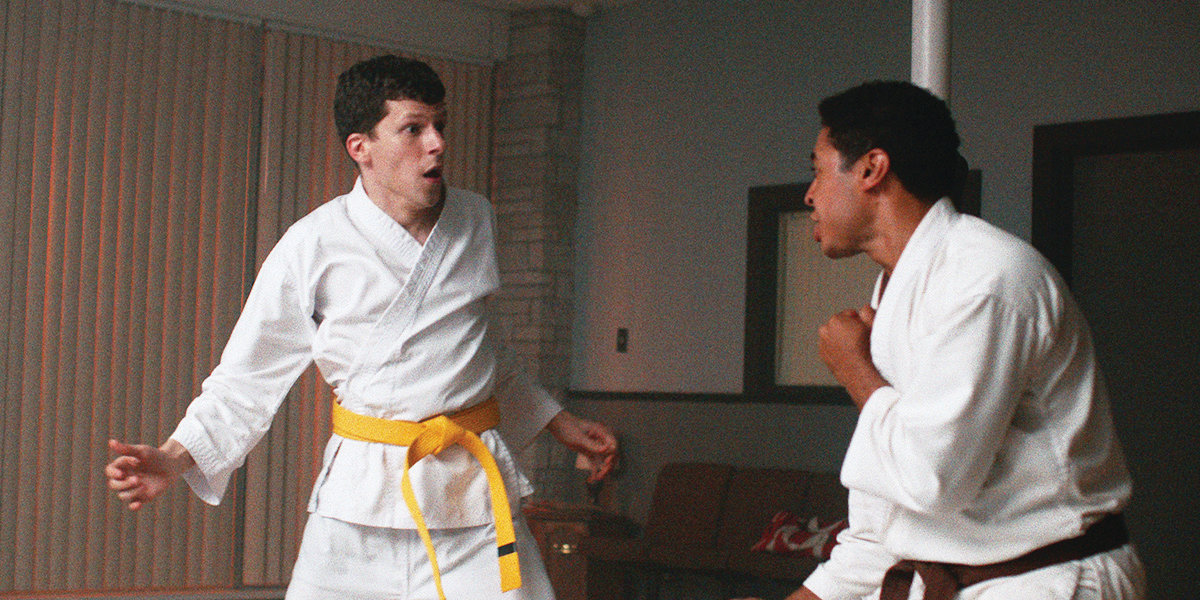
The term “toxic masculinity” has become as virulent as toxic masculinity itself, an amorphous catch-all label attached to any expression mere masculinity itself. The term loses its potency when portrayed in films like “The Art of Self-Defense,” a pitch-black comedy in which the polar extremes of modern masculinity are rendered so risible that any metaphorical value is leached away in the process.
That’s not to say the film isn’t otherwise droll and enjoyable. Jesse Eisenberg plays Casey Davies, a nebbish (natch) who lives alone with his pooch and works as a small-company accountant who isn’t welcome in the employee break room because he’s the one who audits their expense accounts. He wants to visit France some day, but the closest he’ll ever really come is learning French by tape.
When Casey is mugged by a masked motorcycle gang and nearly left for dead during a nocturnal stroll home from the grocery store, he’s left with a bruised body and psyche. Casey drops even more out of sight, and during the waiting period to buy a handgun, he wanders into a storefront dojo, where he’s instantly intoxicated by the discipline, physicality, and self-affirmation of karake. He also admires the cocksure attitude of the dojo’s jut-jawed Sensei, played by Alessandro Nivola, who is always appears on the verge of full-on gonzo and runs the dojo off charisma, an iron fist, and a structural hierarchy built upon rank and a blind devotion to the one person who can bestow that rank, and thus your self-worth.
Sensei inherited the dojo from his former master, a great warrior who was shot and killed during a bird-hunting accident. Sensei’s deliberate, repeated recitation of that story fits into the faux-Coen brothers parlance that fills writer-director Riley Stearns’ script. It also smacks of the sort of rote back story that often conceals something sinister — indeed, it may not be happenstance that Sensei clearly added rule 11 of the dojo, “Guns are for the weak,” after posting the first 10, perhaps to prevent Sensei from suffering a similar fate. Stearns never elaborates on this sidelight, but it’s one of the many mysteries hovering around the dojo’s nefarious, cult-like climate.
Sensei says he sees himself in Casey and gifts the newcomer with a premature yellow belt and an invitation to the night class, a slightly scaled-down version of “Fight Club” that peels back the dojo’s rank violence and misogyny. Sensei cajoles Casey to listen to more metal, learn a strong language like German or Russian instead of French, and trade in his dachshund for a German shepherd, all under the auspices of becoming more masculine. One of the dojo’s best students is Anna (Imogen Potts), an aggressive, no-nonsense fighter who nevertheless isn’t permitted to cool down with the men and will never attain the rank of black belt because, as Sensei sees it, “I realize now that her being a woman will prevent her from ever being a man.”
The fault with the “Faults” director’s screenplay is that its themes are foisted in such farcical fashion but then aren’t explicated or elaborated upon. Aside from madness, Sensei’s motives remain murky, and the narrative goes down increasingly dark rabbit holes, culminating with a flurry of retribution and redemption. But ultimately, there aren’t any wider lessons beyond violence steeped in cockeyed manliness is bad and its repudiation is good. Perhaps the dojo is meant as a microcosm of our toxic masculine culture, but that runs counter to the film’s actual interactions, however fleeting, with the outside world.
Stearns has painted an incomplete portrait, full of color and abstraction but never fully in focus. “The Art of Self-Defense” is unpredictable and sometimes engrossing, but like Sensei and his dojo, the truth below the surface isn’t as rewarding as it appears.